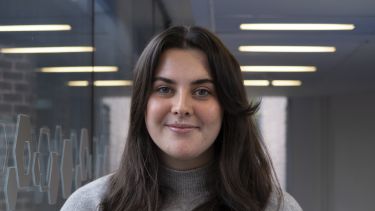The opportunity to learn in a real working environment and have an insight into a potential career has been invaluable to me.

Experiencing life in a new country was fascinating. I saw lots of cultural differences, such as hearing many languages and seeing different patterns to the working day. Adjusting to working life was different after being a student, but I enjoyed having more structure to my days and set working hours.
Working abroad
Annie Goddard
Choosing Sheffield
In particular, I chose this course because of the flexibility that it offered with completing a placement year, and even the international course which offers study abroad. Also, I found the course interesting, as the range of modules focus on all areas of business management, with choices to specialise in different areas in later years.
Why Sheffield University Management
I was impressed by the Management School’s triple-crown accreditation, which ensured a high-standard of teaching. Also, the Employability Hub and its dedicated support for Management School students ensured that I could receive beneficial careers advice. I knew this would be useful when looking for both placement and graduate opportunities.
The benefits of staying at home
Staying in Sheffield definitely gave me a different university experience than most students. I’ve liked it as I know the city and so knew I’d enjoy staying here. Other benefits included saving money, less admin and organisation, and being close to friends and family. However, it also was challenging, with a longer commute and fewer opportunities to meet people. To overcome this, I’d recommend getting involved with societies, sports and making friends with your course-mates!
A placement in Geneva
A highlight of my university experience was my placement year working in Recruitment at CERN, an international organisation based in Geneva, Switzerland. Placements abroad can be more difficult to find, usually called ‘internships’, it isn’t as common for companies to offer year-long opportunities. I found the application process similar to other UK-based placements. I submitted a CV and cover letter initially through an online application, and then was invited to complete an online video assessment. After this, I had an online interview with the team I’d be working in.
Before applying, I booked an appointment with both the University's Careers Service and the Management School’s Employability Hub for advice on my CV. During my placement, the Management School kept in touch with me regularly to ensure that everything was going well. Working abroad can involve more administrative processes, especially visas. Luckily, UK citizens do not require visas to live in Switzerland, and my residence permit was sorted by my workplace. If you’re applying to somewhere that does require a visa, please don’t let this put you off, as your employer should help you to ensure the process goes smoothly.
Adjusting to working life and a new country
Experiencing life in a new country was fascinating. I saw lots of cultural differences, such as hearing many languages and seeing different patterns to the working day. Adjusting to working life was different after being a student, but I enjoyed having more structure to my days and set working hours.
However, there are many similarities, and I worked in an office full of amazing people who were supportive and helpful. Regarding the language barrier, the organisation I worked for used English as an official working language, and so it wasn’t a requirement for me to be fluent in French before starting, thankfully! I worked in an office with people from many different European countries, and everyone spoke fluent English. However, many of my colleagues preferred speaking French, so I picked up different expressions, and had to be confident to ask people to repeat or speak slower. I previously spoke conversational-level Spanish after studying at A-level, and during my placement I completed 2 French courses to take me to a conversational level also. This really helped me to become confident enough to speak French in general conversations, and use it when replying to emails etc.
Adjusting back to university life
Coming back to Sheffield for my final year has been an interesting shift from 9-5 working, back to student life. Many of my course mates also did placements and so are in the same situation, which is nice. I’ve taken some lessons with me, including maintaining a work-life balance, and I really feel more motivated in my studies after seeing real business situations.
Highlight of your course so far?
For me, the highlight would be my placement year. The opportunity to learn in a real working environment and have an insight into a potential career has been invaluable to me.
What skills have you developed so far that will help your future career?
My degree provided me with many skills that I will transfer to my career. A main skill would be approaching situations analytically, which I developed at university when writing assignments and looking at academic literature. This will help me in my career when critical thinking is required. Communication is another important skill, often used for presenting, teamwork, and reporting.
Advice for other students
I’d advise anyone starting this course to do research and ask questions, there are so many courses out there that it can be confusing, but it’s important to choose the right one where you will learn, develop and enjoy yourself. Don’t worry, not many people know exactly what they want to do yet, this course is a good opportunity to learn, whilst keeping your options open.

International undergraduate scholarships
We are offering scholarships of £2,500 for each year (subject to a 60% average) of your undergraduate degree. The maximum value is £10,000 for four-year programmes.

